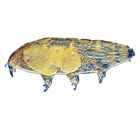Care Guide: Tardigrades
Living Care Information
Hypsibius exemplaris,
strain Z151
commonly known as tardigrade, water bear, space bear, moss piglet
Quick Start Information
After your tardigrade culture arrives, open the shipping container, remove the jar, and inspect the culture.
Once you verify that the shipment is intact, loosen the lid on the jar.
Aerate the culture to replace oxygen depleted during shipment. Place the tip of the pipet (included) into the culture water, squeeze the bulb, and bubble air into the water. Withdraw the pipet and release pressure on the bulb, allowing it to refill with air. Repeat about 4 times.
Your culture will survive with the minimal care described above for 5 to 7 days.
To subculture tardigrades, you will need to provide freshwater green algae as a food source and provide additional care. See instructions below.
About the Organism
- The word tardigrade means “slow stepper.”
- Tardigrades have 8 legs.
- Species of tardigrades have been reported to live in hot springs, on top of mountains, under solid layers of ice, and within ocean sediment.
- Some species can suspend their metabolism and enter a resting state known as cryptobiosis.
- In a cryptobiotic state, a tardigrade is known as a tun.
- Domain: Eukarya
- Kingdom: Animalia
- Phylum: Tardigrada
- Class: Eutardigrada
- Order: Parachela
- Family: Hypsibiidae
- Genus: Hypsibius
- Species: exemplaris, strain Z151
Preparation
Your culture of tardigrades contains adults, juveniles, eggs, and a supply of algae to sustain the culture for approximately a week. Most of the material on the bottom of the culture jar is algae or debris left over from feeding. Tardigrades tend to congregate among the debris. You can observe them with a stereomicroscope equipped with a 20× lens. If you have trouble observing the tardigrades in the debris on the bottom of the jar, place a little spring water in the bottom of a small bowl or beaker. Use a pipet to suction up a small amount of the debris from the jar. Gently expel the debris into the spring water. This action will disperse the tardigrades so you can examine them.
Housing
For long term culturing, we recommend you house tardigrade cultures in glass culture dishes. The dishes provide optimal surface area and allow gas exchange to occur. If culture dishes are not available, you can use any shallow glass container to house tardigrades.
Feeding
Tardigrades will feed on any available source of freshwater green algae, such as Chlorella or Chlorococcum. The algae culture should be noticeably green before use. Pour 100 mL of spring water and 50 mL of the algae culture into a culture dish and inoculate with about 50 tardigrades or as many as you can capture. Feed once per week with about 50 mL of algae culture.
Maintaining and culturing
Maintain the culture jar under fluorescent lighting to keep the algae alive, and the tardigrades will continue to feed. In this setting, your culture may remain viable for days or even weeks. For long-term culturing, you will need spring water, culture dishes, and a supply of freshwater green algae.
Disposal
Carolina provides living organisms for educational purposes only. As a general policy, we do not advocate the release of organisms into the environment. In some states, it is illegal to release organisms, even indigenous species, without a permit. The intention of these laws is to protect native wildlife and the environment.
We suggest that organisms be:
- Maintained in the classroom.
- Donated to another classroom or science department.
- With parental permission, adopted or taken home by students.
- Donated to a nature center or zoo.
- Disposed of humanely, as a last resort.
Biosafety
No biosafety information applies for this organism.
Video
FAQs
How long can I keep my cultures before using them?
If possible, use them within 2 to 3 days of receipt. The longer you delay, the more likely the cultures will spoil, be overturned, etc.
Will the cultures last longer if I place the jars in a refrigerator?
We do not recommend refrigeration or rapid temperature changes. Both may kill the organisms.
Are tardigrades dangerous?
No, tardigrades are not parasitic or pathogenic. Even so, know and follow your district’s guidelines so you are prepared if a student ingests a culture.
My cultures arrived today (Friday), and I need them for class on Monday. Will they be OK?
Remove the cultures from their shipping container and care for them as directed above; they should be fine. You may even discover that the cultures improve a bit because they have time to recover from shipping.
My students are not finding any tardigrades. What can I do?
Perhaps the culture was agitated, scattering the tardigrades. If finding tardigrades is a problem, make sure students are following the preparation procedure. If necessary, have students re-examine the culture under a stereomicroscope so they can observe as they draw an animal into the pipet.
Need help?
We want you to have a good experience. Orders and replacements: 800.334.5551, then select Customer Service. Technical support and questions: caresheets@carolina.com



